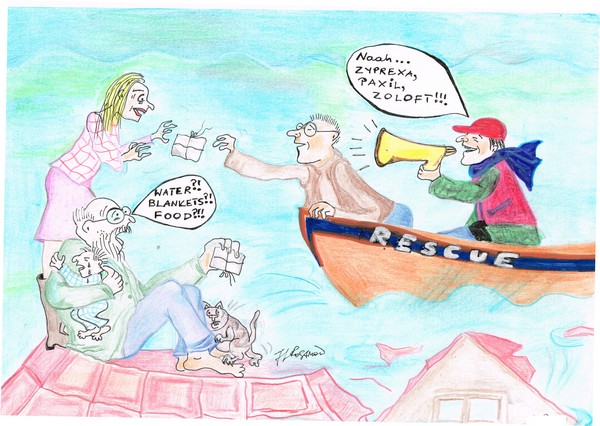 Image courtesy of worradmu at Free DigitalPhotos.net
Image courtesy of worradmu at Free DigitalPhotos.net
I do not believe that one can learn about PTSD from a book only…The syndrome affects a survivor of a traumatic event in multiple ways, no area of life is spared, no syndrome free zone…I prefer using word “survivor” rather than “victim”because people who are ready to fight to get their life back on track are true warriors. Low level of public awareness causes that people who suffer from PTSD are often discriminated against or labelled “crazy” by ignorant individuals. If people who are impacted by trauma should be stigmatized as “mentally ill”, then we are all carriers of “PTSD rabies” that can be triggered at any moment by a traumatic event. Families who experienced war terror will feel the impact even three generations later, so we would have to talk about three generations of “abnormal” individuals whose ancestors happened to be in the wrong place at the wrong time. It is perfectly natural to be affected by a tragic experience and the survivors have right to be treated with respect. PTSD can happen to everyone, at any moment of our unpredictable lives.
Recovering from PTSD can be like coming out of coma and learning to walk and speak again. When you are faced with regaining your ability to manage your emotions, to trust and even to love again, the “when” and “how” of convalescence can be as unforeseeable as coma recovery. Some biological disturbances caused by PTSD can be treated with medicaments but if a war veteran is overfed with drugs and sent away homeless and jobless, then our institutions and our society are missing the point.
Copyright © 2013 by Shield Coaching
PTSD looms up….
A traumatic experience brings threat and helplessness. Sometimes we come out from the mist of a powerful shock and we think we are done and over with the horrible experience just to realize that it’s still echoing in our lives. Sometimes anxiety symptoms gradually disappear, sometimes emotions become more and more overwhelming. PTSD can occur after a single traumatic event or be the result of several traumatic events and build up like a gradual onset burnout.
What are the symptoms?
Shield Coaching’s glossary (some examples):
Echo = re-experiencing the events; recurring nightmares, flashbacks.
Alarm = panic attacks, hyper vigilance, muscle tension.
Alert=insomnia, need to sleep with a weapon, constant preparedness to protect yourself.
Daze = feeling detached, inability to feel positive emotions
Explosive= anger, irritability, outbursts of rage.
Isolation tank=lack of motivation, lack of hope.
Recoil= extreme avoidance of reminders of the trauma.
Silencer =inability to talk about traumatic event.
Reject = trying to push away your loved ones.
If you are hoping that PTSD will be fed up with you one day and just go away on it’s own you’ll be disappointed. Unfortunatelly, the syndrome can be very “faithful”… The symptoms can come and go like waves, but surfing on rough waters is exhausting and it’s more efficient to use PTSD busters so the unwanted visitor doesn’t stick around. I grew up among war survivors and even as a kid who had no idea what PTSD was, I was learning that everyone has a unique response to trauma and a unique path to recovery. Entire generations were left alone to “muddle through somehow” and people were desperately trying to find some ways to deal with pain. Majority of people used negative coping, not because they thought it’s particularly therapeutic to commit suicide by long term substance abuse or suppressing their feelings till a fatal heart attack, but because they didn’t know what else can be done. Learning about the syndrome gives not only relief, but also helps to understand the way PTSD affects our mind and body. If we know “why” and “how” we can decide what way of dealing with it suits us. PTSD is not “all in your head”, it has both emotional and physical mechanisms and getting back up from several sources can be useful. If you opt for a treatment, you opt for re-gaining control of your life and it’s very important that you decide what works best for you, and that you do not feel coerced into a form of therapy.
Task force
When it’s already difficult to think straight, it’s even harder to gather your strength for the battle with negative stress. Since dealing with a traumatic experience affects us in so many ways, it’s necessary to assess the situation and decide what kind of support is needed. Who would you consider a member of your task force and what do you need to get better? Can you rely on a family member, a loved one, a friend? Are you alone? Who can you talk to? Whatever you do, don’t stay in the” isolation tank”. If you have nobody to talk to and you feel you are fed up with suppressing feelings, make sure you confide in someone who is bound by professional secrecy and who makes you feel comfortable. Getting better means also evaluating your medical/legal/financial situation. If you feel too exhausted to look for help alone, contact organisations and professionals who can give you a piece of advice and direct you to the right place.
Stress and anxiety can cause multiple symptoms (e.g. stomach aches) resulting in fear of ill health and destructive worrying. See a doctor and make sure that you do not deprive your body of vitamins and magnesium. Sometimes we forget that a simple mineral deficiency can already cause anxiety, gastrointestinal symptoms, anxiety, abnormal heart rhytms, fatigue, muscle cramps…Solve problems that you can solve, get information you need –it will help to get rid of some additional worries and negative thoughts.
Carefully select members of your task force: someone you can trust and confide in, professionals and organisations you find helpful, a doctor, a fishing buddy…Use whatever works for you and you will get better.
Copyright © 2013 by Shield Coaching
Shield Coaching from SCF8


